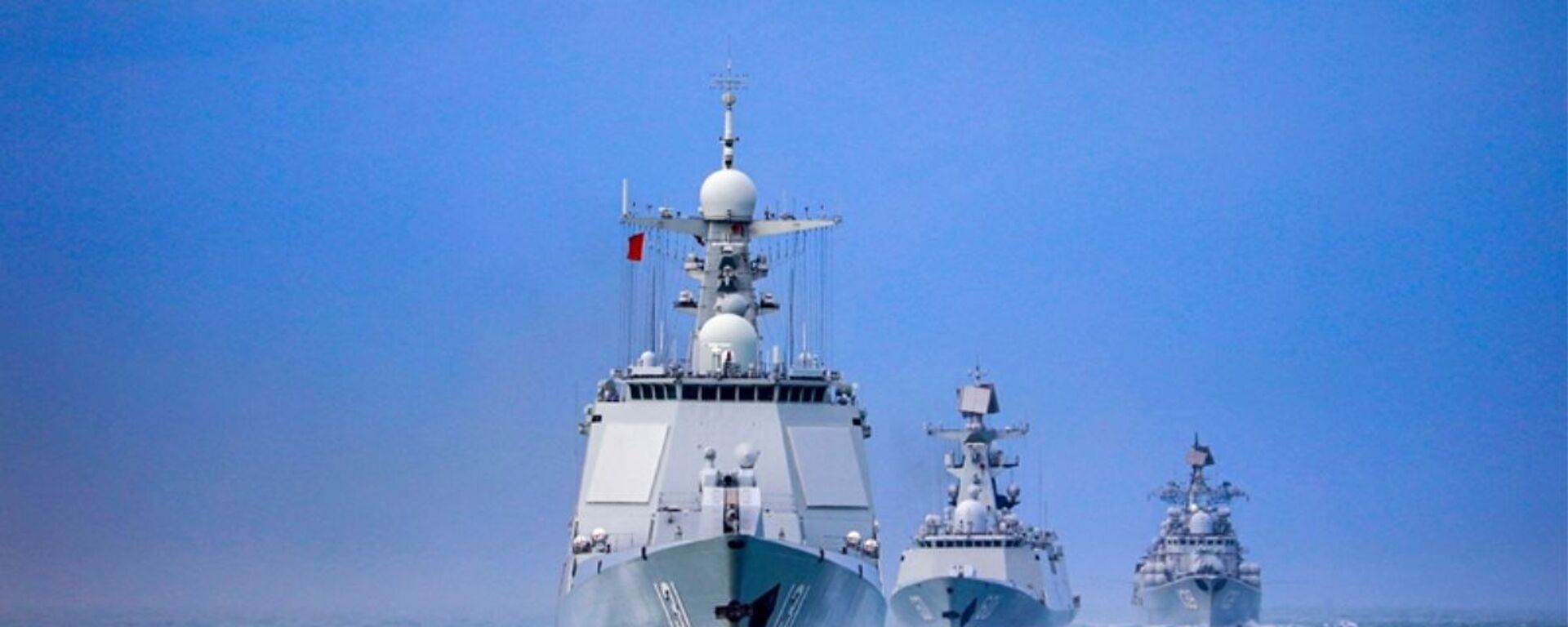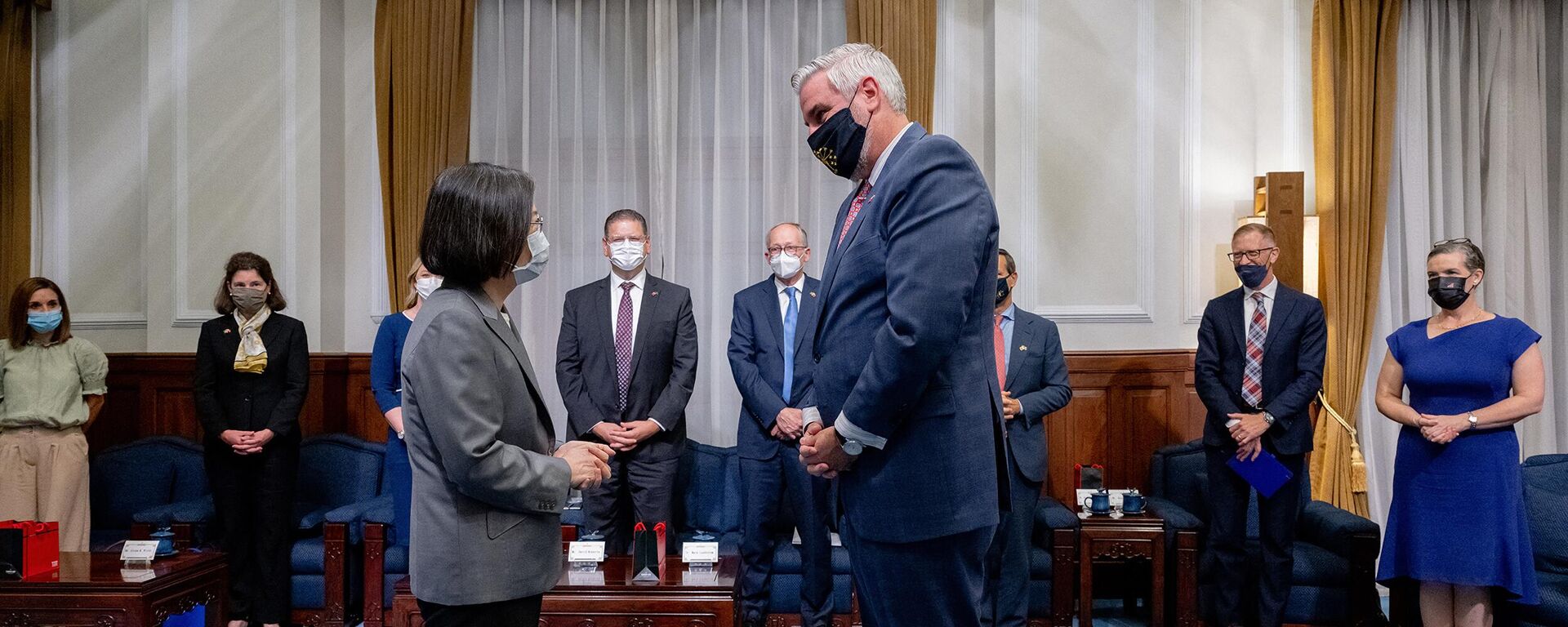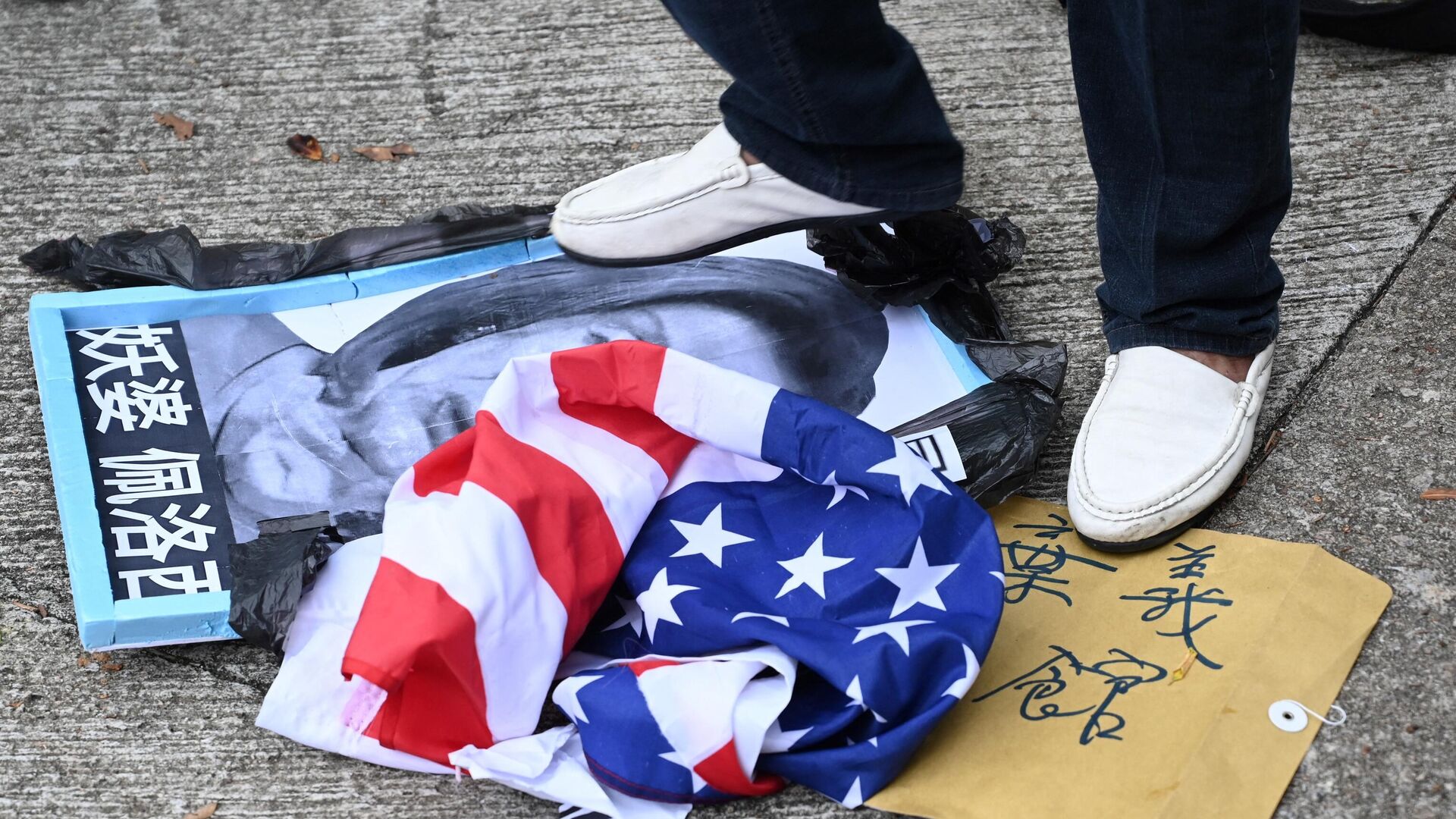https://sputnikglobe.com/20220822/chinese-media-bitterly-disappointed-with-us-ambassadors-job-performance-after-six-months-1099870950.html
Chinese Media Bitterly Disappointed With US Ambassador’s Job Performance After Six Months
Chinese Media Bitterly Disappointed With US Ambassador’s Job Performance After Six Months
Sputnik International
Diplomat and academic R. Nicholas Burns assumed office as United States ambassador to China this spring, filling a vacancy left open for nearly a... 22.08.2022, Sputnik International
2022-08-22T18:01+0000
2022-08-22T18:01+0000
2022-08-22T18:13+0000
us-china tensions over taiwan
china
us
global times
us ambassador
https://cdn1.img.sputnikglobe.com/img/07e6/08/06/1098293937_0:112:3059:1833_1920x0_80_0_0_0caa8b2dab609d703f46bf6f75ec9bb3.jpg
US Ambassador R. Nicholas Burns’ recent interview with CNN in which he accused Beijing of “overreacting” to House Speaker Nancy Pelosi’s visit to Taiwan shows that he is not the scholarly diplomat and wise thinker Beijing had hoped he would be, the Global Times newspaper has suggested.“Many US media outlets deliberately accentuated their tone when covering the interview, with headlines highlighting that the US ambassador to China told [Beijing] it ‘must’ show that it was not a ‘destabilizing factor’ in the Taiwan Straits, making Burns’ statement even harsher and more arrogant and at great odds with his position as a senior diplomat,” the Chinese Communist Party-linked English-language newspaper indicated in an editorial published Monday.GT recalled that ever since Pelosi made her trip to Taiwan at the beginning of August, US officials have been spreading “disinformation” about the visit, calling it her “personal decision,” and then charging China with escalating tensions and “destroying” the Taiwan status quo.“Burns said a lot this time, but nothing new. It’s still the clichés of Washington’s sophistication on Pelosi’s provocative visit, and the hegemonic logic of making unfounded countercharges,” the newspaper suggested.In the CNN interview, Burns said Washington does “not believe there should be a crisis in US-China relations over the visit – the peaceful visit – of the speaker of the House of Representatives to Taiwan." Calling the tensions “a manufactured crisis by the government in Beijing,” the diplomat suggested that the People’s Republic’s response was “an overreaction.”Burns suggested that it was now “incumbent upon the government here in Beijing to convince the rest of the world that it will act peacefully in the future,” and said “there’s a lot of concern around the world that China has now become an agent of instability in the Taiwan Strait.”GT dismissed these sentiments, emphasizing that China’s position on the Taiwan question “could not have been clearer,” and is understood by the “vast majority of people in the international community.”Accordingly, the outlet lamented that although Burns has been “widely regarded as a scholarly diplomat with extensive experience,” and took up his position during a low point in China-US relations, “his overall performance…especially this TV interview, showed that he has not embodied any deeper or wiser thinking on China-US relations and great power politics than some other Washington politicians.”Expressing its “disappointment” with the job Burns has done, GT suggested that the ambassador’s actions demonstrate “that Washington has become a big dye vat, and the number of people who can stay untainted coming out of mud has declined.”Ultimately, the paper said it understood the limitations placed on Burns, given that he takes his marching orders from Washington and the Biden administration.China has spent weeks holding large-scale naval maneuvers and aerial drills around Taiwan in the wake of visits to the island by Pelosi, other US lawmakers, and most recently, the governor of Indiana.Last week, The Wall Street Journal reported that Chinese President Xi Jinping had unambiguously asked Biden to stop Pelosi from traveling to the island, with the US president turning the request down on the pretext that he had no power over Pelosi’s movement because she is a member of a separate branch of government.Taiwan has been under de-facto self-rule since 1949 when, at the end of the Chinese Civil War, Kuomintang nationalist forces led by Chiang Kai-Shek fled to the island as Mao Zedong’s communists established control over the rest of the country. In the 1980s and 1990s, informal diplomatic ties and trade links were established between Taipei and the mainland, with Beijing calling for the eventual peaceful reunification of Taiwan with the People’s Republic along the "One Country – Two Systems" model applied to Hong Kong and Macau. Some factions of the modern-day Kuomintang have expressed support for reunification, although the party pulled its pro-unification plank from its platform in 2017. The governing Democratic Progressive Party, which won elections in 2016, has expressed opposition to reunification, with some of its members flirting with pro-independence sentiments, although formally, the party supports the status quo.
https://sputnikglobe.com/20220822/china-to-hold-live-fire-drills-in-east-china-sea-from-august-23-24-1099863603.html
https://sputnikglobe.com/20220822/china-makes-demarche-to-us-after-indiana-governor-visited-taiwan-1099868331.html
china
Sputnik International
feedback@sputniknews.com
+74956456601
MIA „Rossiya Segodnya“
2022
News
en_EN
Sputnik International
feedback@sputniknews.com
+74956456601
MIA „Rossiya Segodnya“
Sputnik International
feedback@sputniknews.com
+74956456601
MIA „Rossiya Segodnya“
china, us, global times, us ambassador
china, us, global times, us ambassador
Chinese Media Bitterly Disappointed With US Ambassador’s Job Performance After Six Months
18:01 GMT 22.08.2022 (Updated: 18:13 GMT 22.08.2022) Diplomat and academic R. Nicholas Burns assumed office as United States ambassador to China this spring, filling a vacancy left open for nearly a year-and-a-half amid a state of China-US relations he described as the worst since Richard Nixon’s visit to Beijing in 1972.
US Ambassador R. Nicholas Burns’
recent interview with CNN in which he accused Beijing of “overreacting” to House Speaker Nancy Pelosi’s visit to Taiwan shows that he is not the scholarly diplomat and wise thinker Beijing had hoped he would be, the Global Times newspaper has suggested.
“Many US media outlets deliberately accentuated their tone when covering the interview, with headlines highlighting that the US ambassador to China told [Beijing] it ‘must’ show that it was not a ‘destabilizing factor’ in the Taiwan Straits, making Burns’ statement even harsher and more arrogant and at great odds with his position as a senior diplomat,” the Chinese Communist Party-linked English-language newspaper indicated in an
editorial published Monday.
GT recalled that ever since Pelosi made her trip to Taiwan at the beginning of August, US officials have been spreading “disinformation” about the visit, calling it her “personal decision,” and then charging China with escalating tensions and “destroying” the Taiwan status quo.
“Burns said a lot this time, but nothing new. It’s still the clichés of Washington’s sophistication on Pelosi’s provocative visit, and the hegemonic logic of making unfounded countercharges,” the newspaper suggested.

22 August 2022, 14:07 GMT
In the CNN interview, Burns said Washington does “not believe there should be a crisis in US-China relations over the visit – the peaceful visit – of the speaker of the House of Representatives to Taiwan." Calling the tensions “a manufactured crisis by the government in Beijing,” the diplomat suggested that the People’s Republic’s response was “an overreaction.”
Burns suggested that it was now “incumbent upon the government here in Beijing to convince the rest of the world that it will act peacefully in the future,” and said “there’s a lot of concern around the world that China has now become an agent of instability in the Taiwan Strait.”
GT dismissed these sentiments, emphasizing that China’s position on the Taiwan question “could not have been clearer,” and is understood by the “vast majority of people in the international community.”
“The US Congress is a crucial part of the US government stipulated by the US Constitution. Pelosi, as House speaker, represents the US. Pelosi’s provocative visit to Taiwan has severely violated the commitment of no official relationship between the US and the Taiwan island, which thereby seriously undermined the status quo in the Taiwan Straits,” the newspaper stressed.
Accordingly, the outlet lamented that although Burns has been “widely regarded as a scholarly diplomat with extensive experience,” and took up his position during a low point in China-US relations, “his overall performance…especially this TV interview, showed that he has not embodied any deeper or wiser thinking on China-US relations and great power politics than some other Washington politicians.”
Expressing its “disappointment” with the job Burns has done, GT suggested that the ambassador’s actions demonstrate “that Washington has become a big dye vat, and the number of people who can stay untainted coming out of mud has declined.”
Ultimately, the paper said it understood the limitations placed on Burns, given that he takes his marching orders from Washington and the Biden administration.
“…But ‘being limited’ does not mean ‘nothing.’ In fact, at this important historical juncture, the initiative and special significance of a US ambassador to China should not be underestimated,” the outlet stressed. “There are too many people who demolish the bridge in China-US relations and there are too few who help establish it. If even the US ambassador to China joins in dismantling the bridge, then the situation would only get worse,” the paper concluded.
China has spent weeks holding
large-scale naval maneuvers and aerial drills around Taiwan in the wake of visits to the island by Pelosi, other US lawmakers, and most recently,
the governor of Indiana.

22 August 2022, 15:30 GMT
Last week, The Wall Street Journal
reported that Chinese President Xi Jinping had unambiguously asked Biden to stop Pelosi from traveling to the island, with the US president turning the request down on the pretext that he had no power over Pelosi’s movement because she is a member of a separate branch of government.
Taiwan has been under de-facto self-rule since 1949 when, at the end of the Chinese Civil War, Kuomintang nationalist forces led by Chiang Kai-Shek fled to the island as Mao Zedong’s communists established control over the rest of the country. In the 1980s and 1990s, informal diplomatic ties and trade links were established between Taipei and the mainland, with Beijing calling for the eventual peaceful reunification of Taiwan with the People’s Republic along the "One Country – Two Systems" model applied to Hong Kong and Macau. Some factions of the modern-day Kuomintang have expressed support for reunification, although the party
pulled its pro-unification plank from its platform in 2017. The governing Democratic Progressive Party, which won elections in 2016, has expressed opposition to reunification, with some of its members flirting with pro-independence sentiments, although formally, the party supports the status quo.




